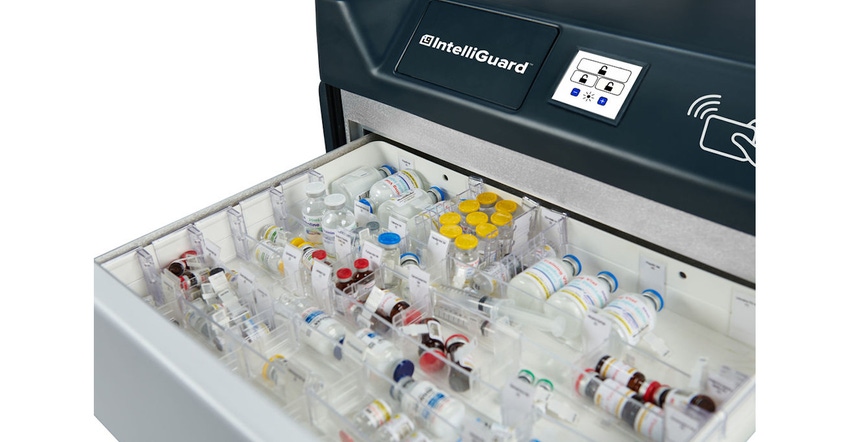Global Healthcare Company Adds Smart Labels to Meds
Fresenius Kabi is embedding packaging for medications commonly used in the operating room with RFID labels. The track-and-trace technology complies with open GS1 global standards and adds an extra layer of patient safety by protecting drug inventories.

In September 2020, global health care company Fresenius Kabi began adding radio frequency identification (RFID) tags to a portfolio of essential medications so hospitals can immediately identify, locate, and manage their inventory. This replaces the current manual method, which is time consuming and fraught with the potential for errors.
Fresenius Kabi’s investment has immediate use: IntelliGuard, a pharmacy automation vendor, is already set up to process these RFID-tagged medications.
The first product in Fresenius Kabi’s +RFID product line —Diprivan (Propofol) 200 mg per 20 mL (10 mg per mL) Injectable Emulsion — launched at the beginning of October and is fully operational with any GS1-compliant equipment, including the IntelliGuard system, which allows interoperability throughout the company’s global supply chain.
“It made sense to have Diprivan be our first +RFID product given that it is the number one prescribed Propofol in the US and we know many hospitals depend upon it every day,” says John Ducker, president and CEO of Fresenius Kabi USA. “It will help hospitals with inventory management and is designed to answer our customers’ call to make it easier to assure that the right products are in the right places at the right time.”
Fresenius Kabi expects to add more than 20 medicines in prefilled syringes and vials to its +RFID portfolio in the United States in 2021.
“Fresenius Kabi’s commitment couldn’t come at a more important time, as hospitals are faced with significant medication supply chain challenges,” said Gordon Krass, CEO of IntelliGuard, in a press release. “Our customers will now be able to get RFID smart-labeled medications directly from a manufacturer. It’s a great example of leadership from industry and a win for both patients and health care providers. Fresenius Kabi’s technology solution further revolutionizes health care, protects patient safety and will undoubtedly bring a new level of track, trace, and inventory visibility throughout hospital supply chains.”
Products in the +RFID portfolio will automatically provide the National Drug Code, expiration date, lot number, and serial number (at the item level).
Pharma industry renews interest in RFID.
The Fresenius Kabi +RFID portfolio launch coincides with the formation of a new consortium, DoseID, which has representation from the entire pharmaceutical supply chain: drug manufacturers, RFID inlay providers, automation vendors, and hospitals. Industry interest in RFID technology remains high, as its many benefits have been known for a decade.
Among its activities, DoseID creates universal standards for how RFID tags are used in the healthcare industry from several angles: RFID quality and performance; data and interoperability; and serialization.
Founding members include Omnicell Inc., Sandoz, Baxter, Hikma, Nephron Pharmaceuticals, Avery Dennison, Kit Check, MPI Label Systems, and CCL Healthcare.
Sumant Ramachandra, M.D., Ph.D., president, Pharmaceuticals and senior vice president, chief science and technology officer at Baxter, says, “Reliable, transparent medication supply chains are crucial to Baxter’s priorities of advancing pharmacy efficiency and patient care. DoseID is an important step toward modernizing these supply chains, and we welcome the opportunity to help guide the development of medication tracking.”
Inside Fresenius Kabi USA’s decisions.
Matthew Kuhn, senior director, external communications and government relations at Fresenius Kabi USA, answers our questions about the company’s development, as well as the industry’s pursuit of RFID technology.
How many hospitals can read RFID tags?
Kuhn: RFID medication tracking systems are in approximately 10% of US hospitals and growing due to the need for tighter medication inventory control. Hospitals that currently use these systems must manually RFID tag and identify every dose of medication, which is a very time consuming and tedious process. Fresenius Kabi will be the first pharmaceutical company to pre-tag and embed medication identification data into the RFID tag and will follow GS1 open, technology independent, global standards that permit full interoperability and compatibility with all RFID systems and allow tags to be read in both the US and internationally.
What is the extra cost? If there is additional cost, how are you handling? Passing along, and, if so, how is the market reacting to that?
Kuhn: Any additional cost for the RFID-enabled medications will be nominal and will vary depending on a customer’s Group Purchasing Organization (GPO) contract.
Fresenius Kabi conducted extensive market research and it overwhelmingly showed that RFID customers want pre-tagged medications from pharmaceutical manufacturers for convenience and because manufacturers are held to cGMP quality standards. Hospitals are already spending time and money to tag products.
Fresenius Kabi +RFID eliminates the time-consuming process of manually tagging medication, which means pharmacists have more time to focus on higher-value clinical services. Our research also indicates that convenience, accuracy, and safety were top of mind with customers when discussing the challenges associated with manual tagging.
How are you handling space constraints on packaging?
Kuhn: Fresenius Kabi +RFID medications take up no more space than non-RFID products. The RFID tag is embedded under the label and is virtually unnoticeable.
What specific IntelliGuard systems are able to handle the +RFID products? Did the company create new equipment/carts to do this?
Kuhn: The Fresenius Kabi +RFID label was developed using global GS1 EPC RFID tag data standards, the same standards used on pharmaceutical barcodes today. It was also designed to be interoperable. Any RFID system designed to read GS1 will be able to read Fresenius Kabi +RFID labels. IntelliGuard RFID systems are GS1 compatible and the feedback from customers has been very positive. GS1 compatibility with other RFID systems is expected to be announced soon.
How does the packaging communicate with the IntelliGuard system?
Kuhn: Historically, RFID medication tracking systems have used proprietary numbering systems on the RFID tags they sell to their customers. These tags are manually applied to medications and the drug data is associated to a proprietary numbering system, like a license plate. As a global pharmaceutical company, it’s important to assure that any hospital or vendor can read the drug information locally on our products, regardless of which type of RFID reader is used. We can do that by using GS1 standards, which are non-proprietary and easily decodable. IntelliGuard was the first to evolve its system to read GS1 RFID EPC tag data standards and we expect more to follow.
Who in hospitals will use this and how?
Kuhn: Hospitals are already using RFID systems in a variety of ways — for example, to track patients and monitor refrigerated units. Fresenius Kabi introduced RFID technology at the source, at the manufacturing level, so it can be used throughout the value chain and, ultimately, by the hospital. Our focus is on medications used in the operating room (OR).
Manually tagging medicines is time-consuming, inefficient, and open to error. In a fast-paced, time-sensitive hospital environment like the OR, healthcare providers aren’t likely to question what’s on the tag, even if it has been programmed wrong. In other words, the safety of a program is only as good as those who program it. That’s why it is beneficial to program these tags with RFID at the point of manufacture — in a cGMP environment. This eliminates the risks associated with manually tagging. We are taking this process and making it better.
Is Fresenius Kabi a member of the DoseID group? If not, why not?
Kuhn: Fresenius Kabi is not currently part of the DoseID consortium. Fresenius Kabi +RFID products are GS1 global standards compliant, which are the prevailing standards used on pharmaceutical products today and contain all the relevant information that hospitals require.
In our market research and conversations with customers, we have been advised to follow GS1 standards for compatibility and interoperability of our barcodes and RFID. As DoseID grows its presence, we will be interested to learn what their requirements will be.
What specific GS1 standard does the Fresenius Kabi RFID tag follow?
Kuhn: The Fresenius Kabi +RFID label was developed using global GS1 EPC RFID tag data standards, the same standards used on pharmaceutical barcodes today. It was also designed to be interoperable.
About the Author(s)
You May Also Like




